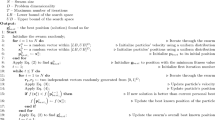Abstract
This paper presents a new and improved version of particle swarm optimization algorithm (PSO) combining the global best and local best model, termed GLBest-PSO. The GLBest-PSO incorporates global–local best inertia weight (GLBest IW) with global–local best acceleration coefficient (GLBest Ac). The velocity equation of the GLBest-PSO is also simplified. The ability of the GLBest-PSO is tested with a set of bench mark problems and the results are compared with those obtained through conventional PSO (cPSO), which uses time varying inertia weight (TVIW) and acceleration coefficient (TVAC). Fine tuning variants such as mutation, cross-over and RMS variants are also included with both cPSO and GLBest-PSO to improve the performance. The simulation results clearly elucidate the advantage of the fine tuning variants, which sharpen the convergence and tune to the best solution for both cPSO and GLBest-PSO. To compare and verify the validity and effectiveness of the GLBest-PSO, a number of statistical analyses are carried out. It is also observed that the convergence speed of GLBest-PSO is considerably higher than cPSO. All the results clearly demonstrate the superiority of the GLBest-PSO.
Similar content being viewed by others
References
Angeline PJ (1998) Evolutionary optimization versus particle swarm optimization: philosophy and performance differences. evolutionary programming VII (1998). Lecture notes in computer science, vol 1447. Springer, Berlin, pp 601–610
Angeline PJ (1999) Using selection to improve particle swarm optimization. In: Proceedings Of IJCNN’99, Washington, USA, pp 84–89
Bonabeau E, Dorigo M and Theraulaz G (1999). Swarm intelligence: from natural to artificial systems. Oxford University Press, New York
Clerc M (1999) The swarm and the queen: towards a deterministic and adaptive particle swarm optimization. In: Proceedings of the congress on evolutionary computation, Washington DC, USA IEEE service center, Piscataway, pp 1951–1957
Corne D, Dorigo M, Glover F (1999) New ideas in optimization, Chap. 25. McGraw Hill, New york, pp 379–387
Eberhart RC, Kennedy J (1995) A new optimizer using particle swarm theory. In: Proceedings of the Sixth international symposium on micro machine and human science, Nagoya, Japan. IEEE service center, Piscataway, pp 39–43
Eberhart RC, Shi Y (1998) Comparison between genetic algorithms and particle swarm optimization. Evolutionary programming VII (1998). Lecture notes in computer science, vol 1447. pp 611–616
Eberhart RC, Shi Y (2000) Comparing inertia weight variants and constriction factors in particle swarm optimization. In: Proceedings of the congress on evolutionary computation, San Diego, USA. IEEE service centerm, Piscataway, pp 84–89
Eberhart RC, Simpson P and Dobbins R (1996). Computational intelligence PC tools. Academic, Boston
Gen M and Cheng R (1997). Genetic algorithms and engineering design. Wiley, New york
Kennedy J, Eberhart RC (1995) Particle swarm optimization. In: Proceedings of the IEEE international conference on neural networks (Perth, Australia). IEEE service center, Piscataway, pp 1942–1948
Kennedy J (1999) Small worlds and mega-minds: effects of neighborhood topology on particle swarm performance. In: proceedings of the congress of evolutionary computation, vol 3. IEEE Press, Piscataway, pp 1931–1938
Khor EF, Tan KC and Lee TH (2002). Learning the search range for evolutionary optimization in dynamic environments. Knowl Inf Syst 4(2): 228–255
Lee ZJ, Su SF, Lee CY and Hung YS (2003). A heuristic genetic algorithm for solving resource allocation problems. Knowl Inf Syst 5(4): 503–511
Lovbjerg M, Ramussen TK, Krink T (2001) Hybrid particle Swarm Optimizer with breeding and sub populations. In: Proceedings of the genetic and evolutionary computation conference (GECCO), San Francisco, USA
Ratnaweera A, Halgamuge SK and Watson C (2004). Self-organizing hierarchical particle swarm optimizer with time-varying acceleration Coefficient. IEEE Trans Evol Comput 8(3): 240–255
Senthil Arumugam M, Rao MVC, Aarthi C (2005) Competitive approaches to PSO algorithms via new acceleration co-efficient variant with mutation operators. In: Proceedings of the fifth international conference on computational intelligence and multimedia applications (ICCIMA’05). IEEE Computer Science Press, Piscataway, pp 225–230
Shi Y, Eberhart RC (1998a) A modified particle swarm optimizer. In: Proceedings of the IEEE international conference on evolutionary computation, Anchorage, Alaska
Shi Y, Eberhart RC (1998b) Parameter selection in particle swarm optimization. Evolutionary programming VII. Lecture notes in computer science, vol.1447. Springer, Berlin, pp 591–600
Shi Y, Eberhart RC (1999) Empirical study of particle swarm optimization. Congress on evolutionary computation, Washington D.C., USA, pp 1945–1949
Srinivasan R (2007) Artificial intelligence methodologies for agile refining: an overview, Knowl Inf Syst Springer, Berlin. doi:10.1007/s10115-006-0057-z
Suganthan PN (1999) Particle swarm optimizer with neighborhood operator. In: Proceedings of the 1999 congress of evolutionary computation. vol 3. IEEE Press, Piscataway, pp 1958–1962
Van Den Bergh F (2002) An analysis of particle swarm optimization. Ph.D. dissertation, Faculty of Natural and Agricultural Science, University of Petoria, Petoria, South Africa
Yao X, Liu Y and Lin G (1999). Evolutionary programming made faster. IEEE Trans Evol Comput 3(2): 82–102
Author information
Authors and Affiliations
Corresponding author
Rights and permissions
About this article
Cite this article
Senthil Arumugam, M., Rao, M.V.C. & Chandramohan, A. A new and improved version of particle swarm optimization algorithm with global–local best parameters. Knowl Inf Syst 16, 331–357 (2008). https://doi.org/10.1007/s10115-007-0109-z
Received:
Revised:
Accepted:
Published:
Issue Date:
DOI: https://doi.org/10.1007/s10115-007-0109-z




